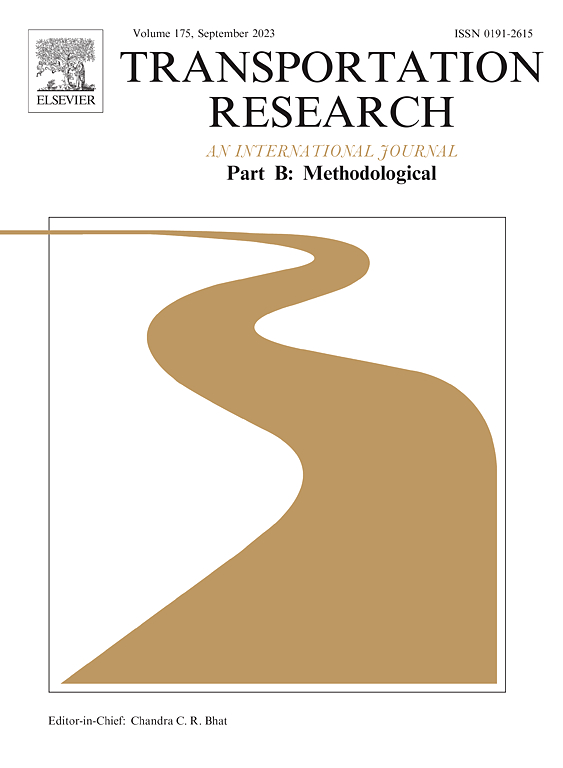Bayesian inference of time-varying origin–destination matrices from boarding and alighting counts for transit services
IF 6.3
1区 工程技术
Q1 ECONOMICS
引用次数: 0
Abstract
Origin–destination (OD) demand matrices are crucial for transit agencies to design and operate transit systems. This paper presents a novel temporal Bayesian model designed to estimate transit OD matrices at the individual bus-journey level from boarding and alighting counts at bus stops. Our approach begins by modeling the number of alighting passengers at subsequent bus stops, given a boarding stop, through a multinomial distribution parameterized by alighting probabilities. Given the large scale of the problem, we generate alighting probabilities with a latent variable matrix and factorize it into a mapping matrix and a temporal matrix, thereby substantially reducing the number of parameters. To further encode a temporally-smooth structure in the parameters, we impose a Gaussian process prior on the columns of the temporal factor matrix. For model inference, we develop a two-stage algorithm with the Markov chain Monte Carlo (MCMC) method. In the first stage, latent OD matrices are sampled conditional on model parameters using a Metropolis–Hastings sampling algorithm with a Markov model-based proposal distribution. In the second stage, we sample model parameters conditional on latent OD matrices using slice and elliptical slice sampling algorithms. We assess the proposed model using real-world data collected from three bus routes with varying numbers of stops, and the results demonstrate that our model achieves accurate posterior mean estimation and outperforms the widely used iterative proportional fitting (IPF) method. Additionally, our model can provide uncertainty quantification for the OD demand matrices, thus benefiting many downstream planning/operational tasks that require robust decisions.
基于公交上下车次数的时变出发地矩阵的贝叶斯推理
出发地需求矩阵是交通运输机构设计和运营交通运输系统的关键。本文提出了一种新的时间贝叶斯模型,用于从公交站点的上车和下车次数估计公交OD矩阵。我们的方法首先通过一个由下车概率参数化的多项分布,对给定一个上车站的后续公交站下车乘客的数量进行建模。考虑到问题的规模,我们用一个潜在变量矩阵来生成降落概率,并将其分解为一个映射矩阵和一个时间矩阵,从而大大减少了参数的数量。为了进一步在参数中编码时间平滑结构,我们对时间因子矩阵的列施加高斯过程先验。对于模型推理,我们提出了一种两阶段的马尔可夫链蒙特卡罗(MCMC)算法。在第一阶段,使用基于马尔可夫模型的建议分布的Metropolis-Hastings采样算法对潜在OD矩阵进行有条件的模型参数采样。在第二阶段,我们使用切片和椭圆切片采样算法对潜在OD矩阵条件下的模型参数进行采样。我们使用三条不同站点数量的公交路线的真实数据对所提出的模型进行了评估,结果表明我们的模型获得了准确的后验均值估计,并且优于广泛使用的迭代比例拟合(IPF)方法。此外,我们的模型可以为OD需求矩阵提供不确定性量化,从而有利于许多需要稳健决策的下游计划/操作任务。
本文章由计算机程序翻译,如有差异,请以英文原文为准。
求助全文
约1分钟内获得全文
求助全文
来源期刊
CiteScore
12.40
自引率
8.80%
发文量
143
审稿时长
14.1 weeks
期刊介绍:
Transportation Research: Part B publishes papers on all methodological aspects of the subject, particularly those that require mathematical analysis. The general theme of the journal is the development and solution of problems that are adequately motivated to deal with important aspects of the design and/or analysis of transportation systems. Areas covered include: traffic flow; design and analysis of transportation networks; control and scheduling; optimization; queuing theory; logistics; supply chains; development and application of statistical, econometric and mathematical models to address transportation problems; cost models; pricing and/or investment; traveler or shipper behavior; cost-benefit methodologies.

 求助内容:
求助内容: 应助结果提醒方式:
应助结果提醒方式:


